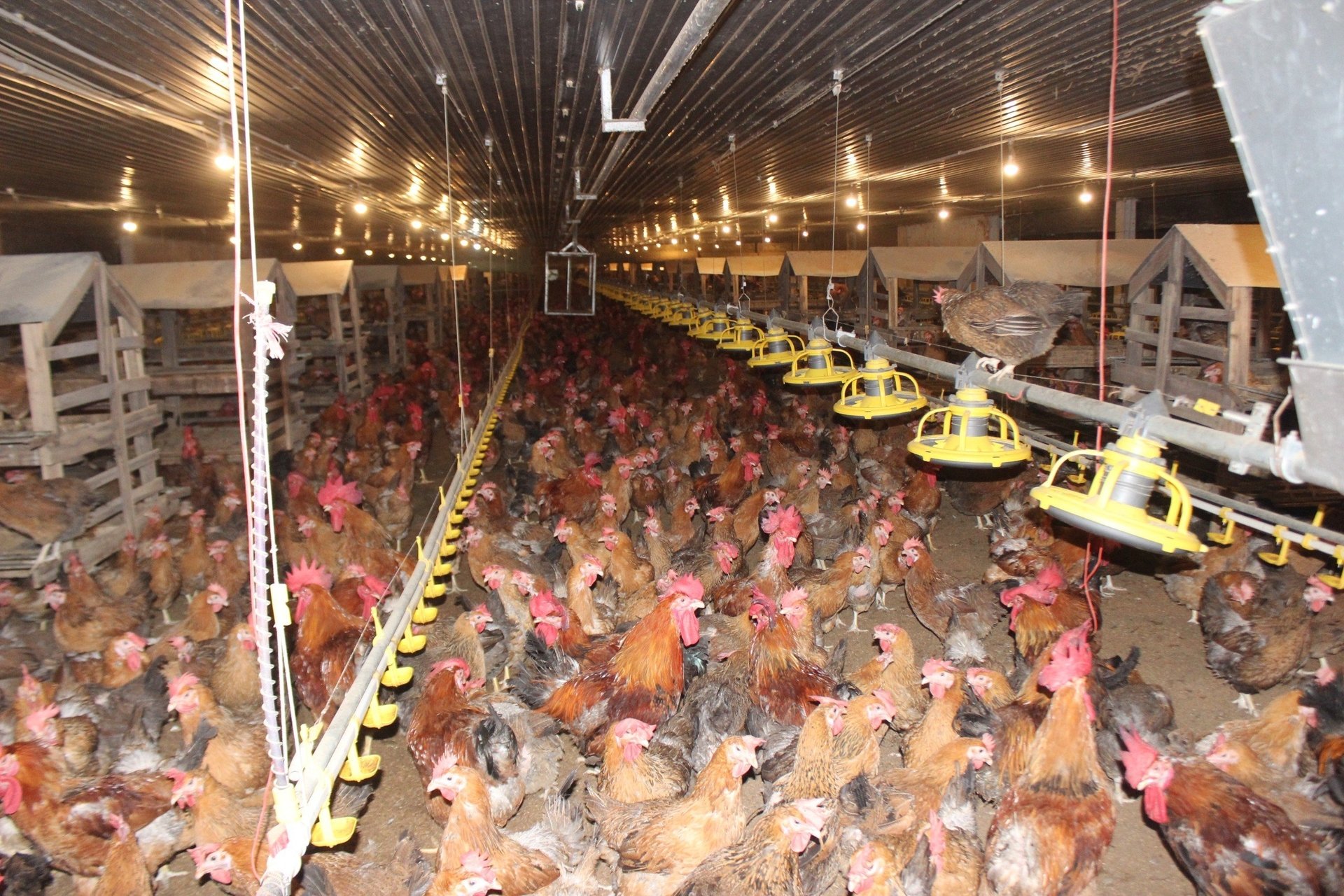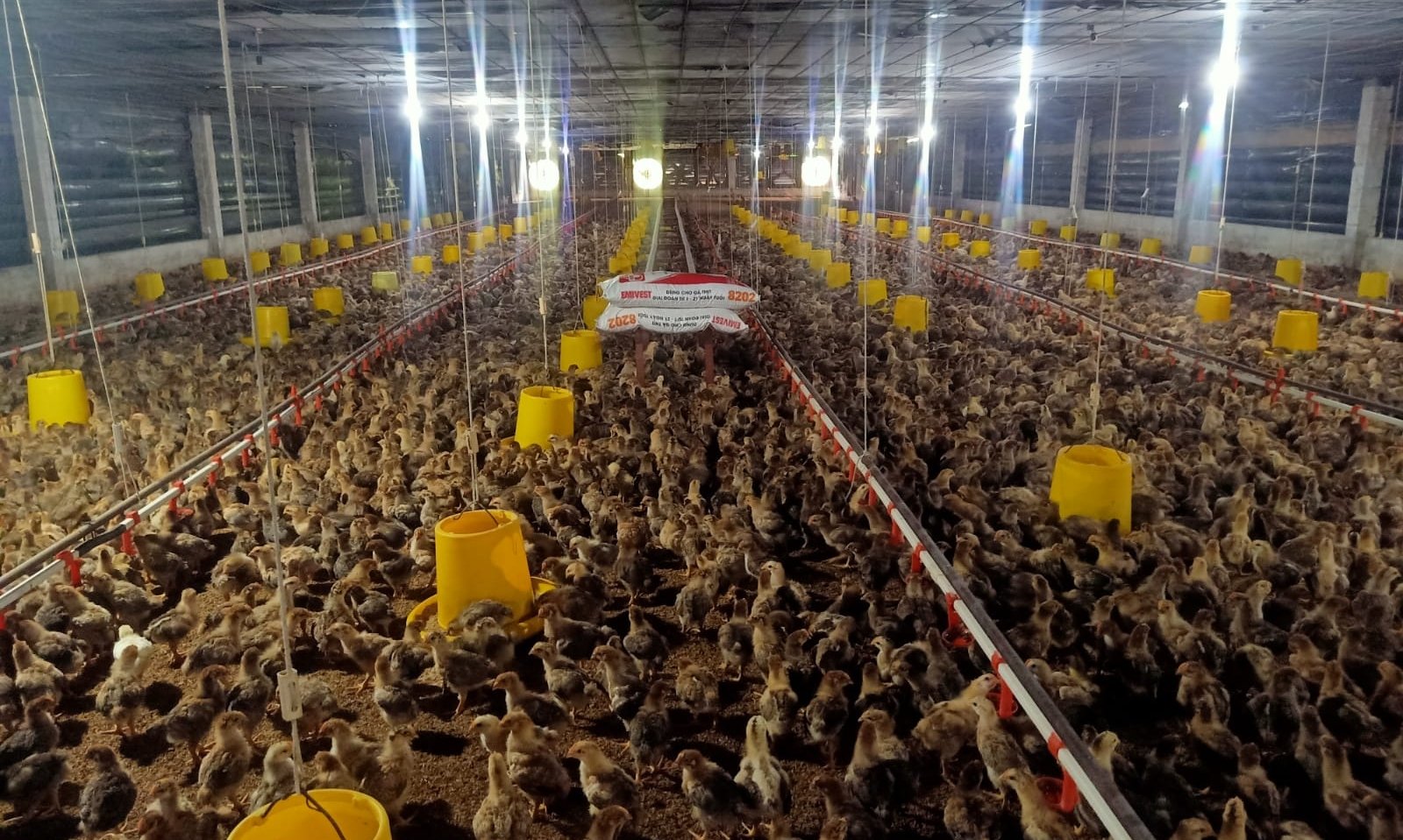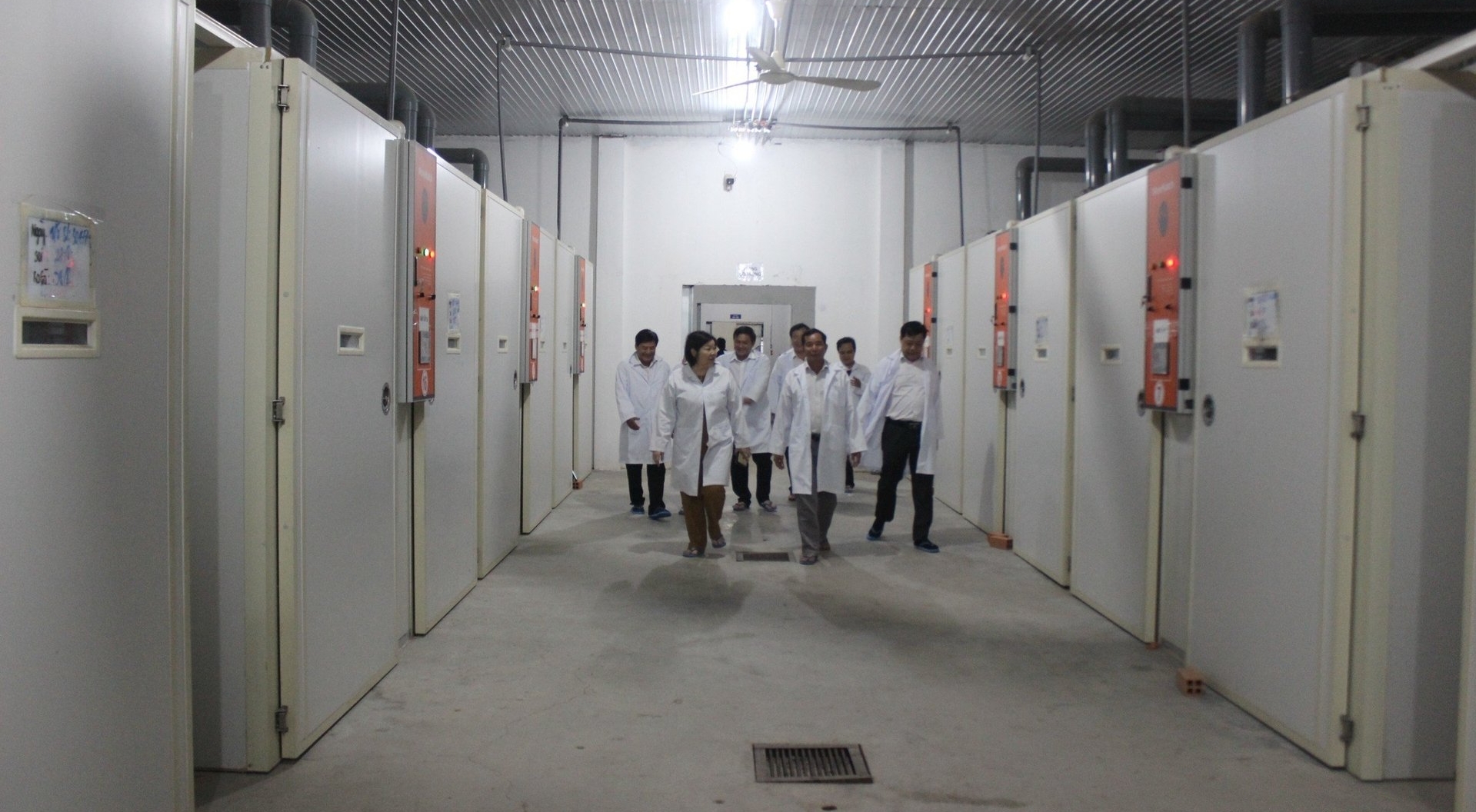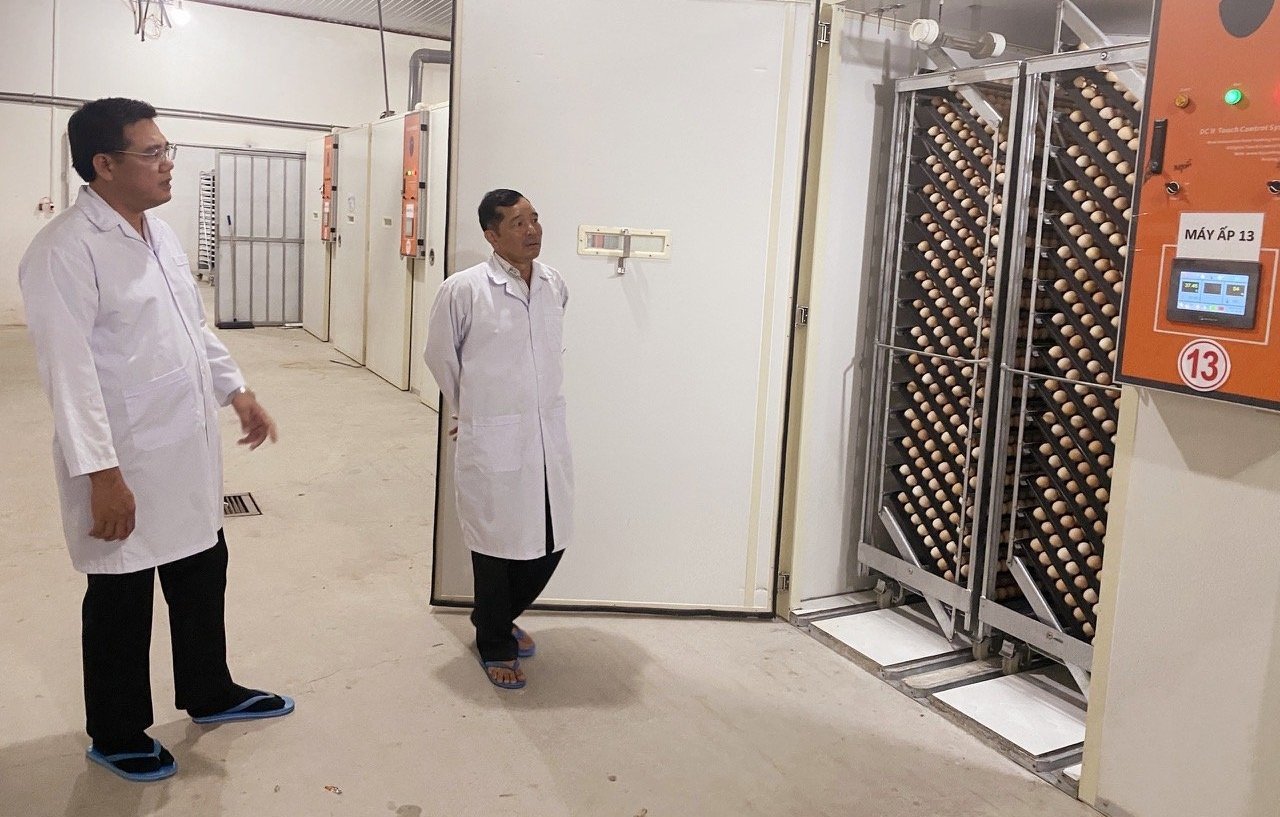May 23, 2025 | 19:16 GMT +7
May 23, 2025 | 19:16 GMT +7
Hotline: 0913.378.918
May 23, 2025 | 19:16 GMT +7
Hotline: 0913.378.918

High-tech commercial chicken farm of Mr. Dinh Ngoc Khuong in An Binh commune, Phu Giao district (Binh Duong). Photo: Tran Trung.
Mr. Dinh Ngoc Khuong is well-known in his hometown of An Binh commune, Phu Giao district, Binh Duong province, for being the pioneer in introducing chicken into cold farms in accordance with the high-tech adoption process, thereby contributing to the annual generation of tens of thousands of billions of dongs.
The agricultural campus is allocated methodically, and disease prevention is ensured in accordance with the recommendations of the relevant agencies. Mr. Khuong revealed that he previously raised chickens for foreign companies before deciding to engage in his own farms in 2012, after years of experience.

Cool farming not only ensures environmental hygiene and disease safety but also reduces the number of livestock workers by about 70%. Photo: Tran Trung.
The high-tech model for poultry farming entails converting an open farm into a closed farm with a cooling system, feed system, cooling water system, etc., thereby minimizing the use of antibiotics and requiring fewer employees. When using the open poultry farming model, it can take up to 60 days to be able to sell broiler chickens, whereas it only takes 52 days on a chilled farm.
In addition, to ensure disease safety, the farm's primary criterion is "no internal output, no foreign input," so, in addition to the agricultural area, there are also areas such as the power plant area, the canteen area, the entertainment area, and the housing area for employees. Before accessing the compound, visitors are required to thoroughly disinfect themselves in accordance with regulations.
Mr. Khuong claims that cold farming not only guarantees environmental hygiene and disease safety but also reduces the number of livestock employees by approximately 70%. Not only is investing in cold farm livestock consistent with local policies, but it is also a necessity for producers. Because the farm is frigid and has a closed investment, producers can develop their domestic economy with confidence.

Mr. Khuong's egg incubation factory area. Photo: Tran Trung.
Since 2014, after mastering the technology and in order to proactively source and distribute seeds to locals, he has aggressively invested in the construction of a large-capacity egg incubation chamber.
When entering the egg incubation factory area, the egg steaming room, egg preservation room, incubation room, egg inspection room, poultry hatching room, and chicken hatching room captured our attention. All of these processes are performed using modern machinery continuously day and night under the supervision of skilled employees.
"Before the invention of the automatic line, processes such as steaming, preserving, inspecting eggs, and observing poultry hatch were time-consuming and only 70-80% effective. Since investing in a modern egg incubation line, the rate of eggs has increased almost exponentially", Mr. Khuong said enthusiastically.

Mr. Duc (left) and Mr. Khuong share experience in effective animal husbandry. Photo: Tran Trung.
Currently, his property occupies approximately 30,000 square meters and houses between 400,000 and 600,000 poultry. There are more than 40,000 laying hens and 12 modern incubators to produce poultry varieties, producing an average of 15,000 to 17,000 eggs per day and generating a monthly profit of nearly 1 billion VND after deducting costs.
According to Mr. Khuong, despite this model's high economic efficiency, producers require both capital and animal husbandry knowledge in order to pursue this profession. "Once I have effectively hatched my own chickens, I will gladly share my experiences and breeds with poultry producers. Then, I purchased poultry for consumption from individuals. Mr. Khuong revealed that the farm initially works with 18 local producers and is continuously expanding."
According to Mr. Tran Minh Duc, Head of the Phu Giao District Animal Husbandry and Veterinary Station, in recent years the region has fostered the growth of livestock and poultry husbandry in the direction of biosecurity, dietary hygiene, and safety. A concentrated farm coupled with refuse treatment ensures environmental cleanliness. Ensure the sustained growth of livestock populations in the region.
The agricultural industry is currently advising farmers on how to implement technical advances in breeds and feed, implement biosafety farming processes, and assure disease safety in order to reduce risks. In addition, it is suggested that producers participate in and expand linkage chains in livestock husbandry in order to stabilize product prices and output.
Mr. Dinh Ngoc Khuong has been recognized by the Binh Duong Provincial Farmers' Association as an exemplary farmer for the period 2019-2021 and is one of 63 outstanding Vietnamese farmers in 2021, according to Mr. Tran Minh Duc.
Translated by Linh Linh

(VAN) The People's Committee of Tra Vinh province has approved an adjustment to the investment policy for the Green Hydrogen Plant project, increasing its area to approximately 52.76 hectares.
![Reducing emissions from rice fields: [2] Farmers’ commitment to the soil](https://t.ex-cdn.com/nongnghiepmoitruong.vn/608w/files/news/2025/05/05/dsc08881jpg-nongnghiep-140632.jpg)
(VAN) Clean rice cultivation model in Thuong Tan commune, Bac Tan Uyen district, is assisting local residents in achieving sustainable agriculture by substantially reducing costs, increasing productivity, and protecting the environment.

(VAN) At the conference to disseminate Resolution No. 68, AgriS introduced its digital agricultural ecosystem and reaffirmed its commitment to accompanying the Government in promoting private sector development and sustainable agriculture.

(VAN) 'Blue Ocean - Blue Foods' initiative is designed to restore marine ecosystems and establish sustainable livelihoods for local communities by cultivating a minimum of 1,000 hectares of cottonii seaweed in the first three years.
/2025/05/21/4642-3-112707_603.jpg)
(VAN) The V-SCOPE project has made direct contributions to three out of six pillars of the Comprehensive Strategic Partnership between Vietnam and Australia.

(VAN) Facing the threat of rabies spreading to the community, Gia Lai province urgently carries out measures to vaccinate dogs and cats on a large scale.

(VAN) Disease-free livestock farming not only protects livestock herds but also stabilizes production and livelihoods for many farmers in Tuyen Quang.